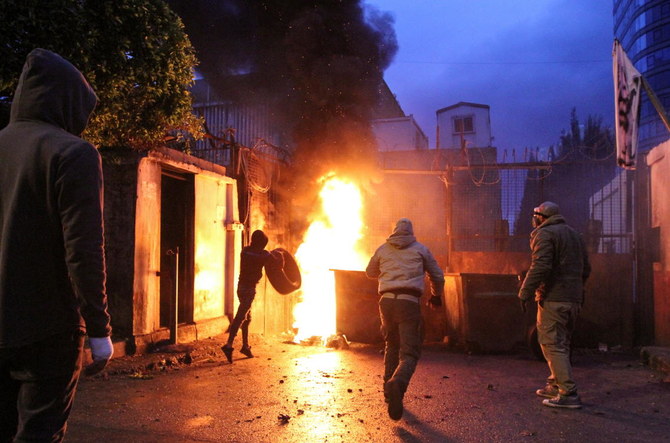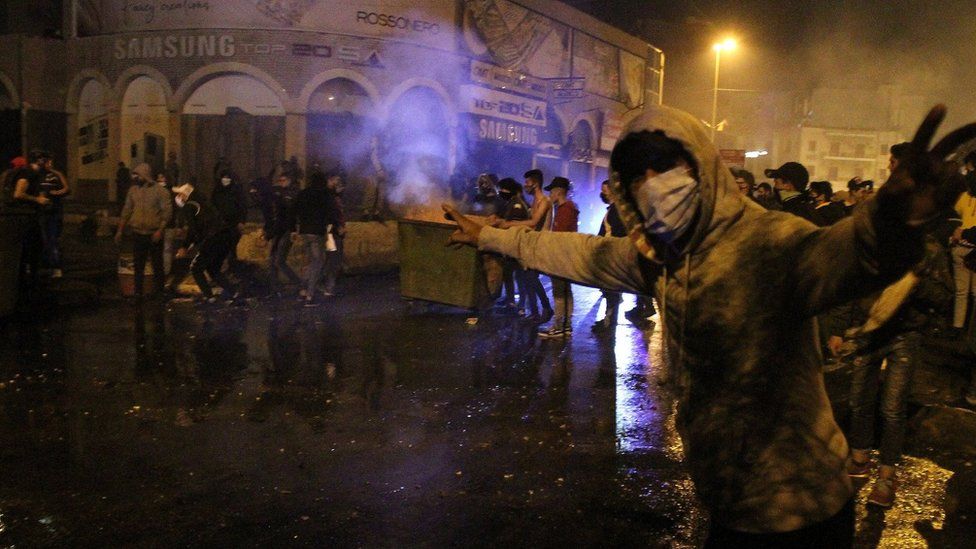
by reuters -- TRIPOLI, Lebanon: Lebanon’s caretaker prime minister and its president on Friday condemned overnight violence in the city of Tripoli, where protesters angry over a strict lockdown clashed with security forces and set the municipality building on fire. Thursday was the fourth straight night of unrest in one of Lebanon’s poorest cities, after the Beirut government imposed a 24-hour curfew to curb a surge in the COVID-19 pandemic that has killed more than 2,500 people and compounded an economic crisis. “The criminals who set the municipality on fire and attempted to burn the court...represent a black hatred for Tripoli,” Prime Minister Hassan Diab said in a statement. “The challenge now is in defeating these criminals by arresting them one by one and referring them to the judicial system.” President Michel Aoun also condemned the violence. Flames engulfed the Tripoli municipal government building after it caught fire just before midnight on Thursday. Police had been firing tear gas at protesters hurling petrol bombs. A funeral for a man who died from a gunshot wound on Wednesday night had given fuel to protesters. Security forces said they had fired live rounds to disperse rioters trying to storm the government building.
Diab’s statement did not mention the killing; Human Rights Watch has called for it to be investigated. “We promise to work quickly to restore the municipality building of Tripoli so that it remains an expression of its dignity and pure heritage,” Diab said. The lockdown against the coronavirus, in effect since Jan. 11, is piling extra hardship on the poor, now more than half the Lebanese population who get little government aid. “We are demanding a state, we are demanding a country and we are demanding an improvement to the social and political conditions in Tripoli,” said Rabih Mina, a Tripoli resident who joined the anti-government protests. The financial meltdown gripping Lebanon could render people more dependent on political factions for aid and security, in a throwback to the 1975-90 civil war era of dominant militias. Some analysts have warned that security forces, their wages fast losing value, would not be able to contain rising unrest.

![Lebanese protesters gather outside the Serail, headquarters of the Governorate of North Lebanon, during ongoing demonstrations that marked the third consecutive night of protests [Fathi AL-MASRI/AFP]](https://www.aljazeera.com/wp-content/uploads/2021/01/000_8ZN36R.jpg?resize=770%2C513)
by middleeasteye.net -- Amnesty International urged France to halt weapons sales to Lebanon, saying French-manufactured rubber bullets, tear gas grenades and launchers had played a "shameful" role in quelling peaceful demonstrations in the country. In a report released on Thursday by Amnesty, along with the University of California, Berkeley, and the University of Essex, a range of French ammunition from tear gas canisters and pepper sprays to grenade launchers, rubber bullets, and armoured vehicles were used to suppress protests between 2015 and 2020. Middle East Eye first reported in November 2019 that many of the tear gas canisters used against protesters in Lebanon were French-manufactured, with some being military-grade.
"France has for years been supplying Lebanese security forces with law enforcement equipment that they then used to commit or facilitate serious human rights violations," the rights group said in a statement on Thursday. "We call on France to ensure that there are no further sales until the Lebanese authorities have acknowledged past violations," said Aymeric Elluin, advocacy officer on arms transfers at Amnesty International France. "Lebanese security forces are operating in a climate of impunity."

By Ben Dickson - venturebeat.com -- Self-driving car startup Cruise has just gotten a $2 billion infusion from Microsoft, General Motors, Honda, and institutional investors, according to a joint statement by Cruise, its owner GM, and Microsoft on Tuesday. The investment will bring Cruise’s valuation to $30 billion and make Microsoft an official partner. Per Tuesday’s announcement: “To unlock the potential of cloud computing for self-driving vehicles, Cruise will leverage Azure, Microsoft’s cloud and edge computing platform, to commercialize its unique autonomous vehicle solutions at scale. Microsoft, as Cruise’s preferred cloud provider, will also tap into Cruise’s deep industry expertise to enhance its customer-driven product innovation and serve transportation companies across the globe through continued investment in Azure.” So Cruise will get the much-needed funds to conduct research and (possibly discounted) access to Microsoft’s cloud computing resources and move closer to its goal of launching a purpose-built self-driving car.
But in the long run, Microsoft stands to gain more from the deal. Not only will it get two very lucrative customers for its cloud business (Azure will also become GM’s preferred cloud provider, per the announcement), but when seen in the broader context of Microsoft’s self-driving car strategy, “Cruise’s deep industry expertise” will possibly give Microsoft a solid foothold in the future of the still-volatile self-driving car industry. At a time when most major tech companies are interested in acquiring self-driving car startups or launching their own initiatives, Microsoft’s hands-off approach could eventually turn it into an industry leader.
Self-driving cars from the AI business perspective

By Richard Brody --Netflix is a cinematic rummage sale: some authentic treasures gleam enticingly atop a pile of junk, within which even rarer gems lurk—but it requires some digging. Reader, I dug—and found that Netflix is offering a batch of several dozen Lebanese films from the past fifty years, at least two of which are extraordinary fusions of imagination and observation. Both of those films, “Whispers,” from 1980, and “The Little Wars,” from 1982, are by the same director, Maroun Bagdadi; the first is a documentary and the other is a work of fiction, but both, remarkably, prominently feature the same person—the photojournalist Nabil Ismaïl, who is a subject in “Whispers” and an actor in “The Little Wars”—in an overlap that exemplifies Bagdadi’s original approach to both forms.
“Whispers”
The documentary follows the poet Nadia Tueni as she travels through Lebanon, which at the time was physically and emotionally devastated after five years of civil war. The format is something like a virtual, fictional road movie, albeit one in which the drama lies not in a specific narrative but in the question of Lebanon’s immediate future. From the start, there’s death in the air—at a gathering of young people, a man sings a melancholy ballad of a mother’s grief for a son killed in war, and the song continues on the soundtrack as Bagdadi shows images of a city’s bombed-out buildings and rubble-strewn streets. Tueni and Ismaïl wander through the desolate cityscape, the labyrinth of Beirut’s ruins, as Ismaïl takes photographs. Then, on his own, Ismaïl plunges into the busy heart of a market street, in an extended and exciting handheld shot that’s accompanied by his voice-over, which—like the voice-overs in Claude Lanzmann’s “Shoah”—creates a virtual image of the past, which, fused with present-tense observations, renders the past seemingly more present than what’s seen on the screen.
Khazen History


Historical Feature:
Churches and Monasteries of the Khazen family

St. Anthony of Padua Church in Ballouneh
Mar Abda Church in Bakaatit Kanaan
Saint Michael Church in Bkaatouta
Saint Therese Church in Qolayaat
Saint Simeon Stylites (مار سمعان العامودي) Church In Ajaltoun
Virgin Mary Church (سيدة المعونات) in Sheilé
Assumption of Mary Church in Ballouneh
1 - The sword of the Maronite Prince
2 - LES KHAZEN CONSULS DE FRANCE
3 - LES MARONITES & LES KHAZEN
4 - LES MAAN & LES KHAZEN
5 - ORIGINE DE LA FAMILLE
Population Movements to Keserwan - The Khazens and The Maans
ما جاء عن الثورة في المقاطعة الكسروانية
ثورة أهالي كسروان على المشايخ الخوازنة وأسبابها
Origins of the "Prince of Maronite" Title
Growing diversity: the Khazin sheiks and the clergy in the first decades of the 18th century
Historical Members:
Barbar Beik El Khazen [English]
Patriach Toubia Kaiss El Khazen(Biography & Life Part1 Part2) (Arabic)
Patriach Youssef Dargham El Khazen (Cont'd)
Cheikh Bishara Jafal El Khazen
Patriarch Youssef Raji El Khazen
The Martyrs Cheikh Philippe & Cheikh Farid El Khazen
Cheikh Nawfal El Khazen (Consul De France)
Cheikh Hossun El Khazen (Consul De France)
Cheikh Abou-Nawfal El Khazen (Consul De France)
Cheikh Francis Abee Nader & his son Yousef
Cheikh Abou-Kanso El Khazen (Consul De France)
Cheikh Abou Nader El Khazen
Cheikh Chafic El Khazen
Cheikh Keserwan El Khazen
Cheikh Serhal El Khazen [English]
Cheikh Rafiq El Khazen [English]
Cheikh Hanna El Khazen
Cheikha Arzi El Khazen
Marie El Khazen